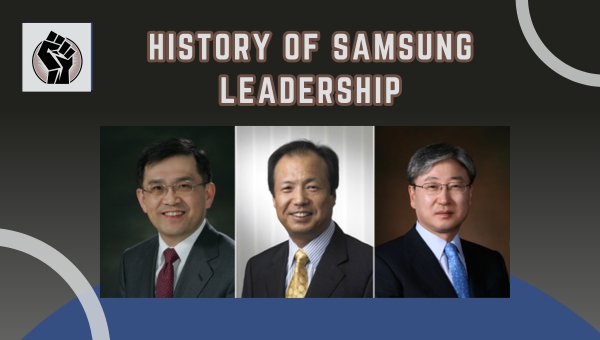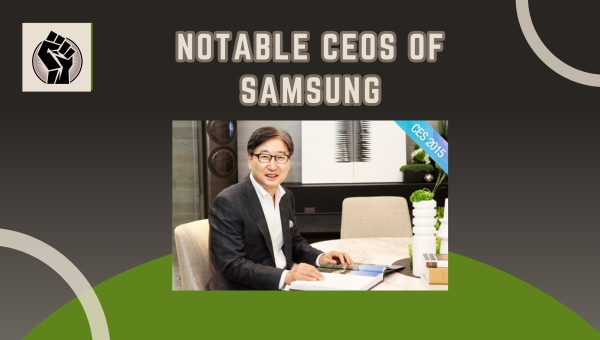A company evolving from a small trading firm to a global tech powerhouse. The story of Samsung’s rise is deeply intertwined with its exceptional leadership. The CEOs of Samsung have each played a pivotal role in shaping its trajectory, driving innovation, and overcoming challenges.
From its founding days to becoming a global technology leader, this journey showcases how visionary leadership can transform industries. Dive into the fascinating history of Samsung’s leaders to uncover their strategies, philosophies, and the impact they’ve made on the world stage. Whether you’re a tech enthusiast or curious about business leadership, this exploration will leave you inspired.
History of Samsung Leadership
Samsung’s journey from a small trading company to a global technology leader has been guided by visionary leadership.

Over the years, the company has transformed its strategies to adapt to changing markets and technologies. Below, we delve into the early days of Samsung’s leadership and its evolution through decades.
Founding Years and Early Leadership
Samsung was established in 1938 by Lee Byung-chul in Su-dong, South Korea. Initially, it operated as a trading company dealing in groceries, dried fish, and noodles. Lee’s leadership style, often described as visionary yet autocratic, played a crucial role in laying the foundation for Samsung’s diversified business approach.
During these formative years, Lee focused on creating a company that could contribute to South Korea’s economic recovery and growth, especially during challenging times like World War II and the Korean War.
His ability to identify opportunities and his dedication to excellence allowed Samsung to overcome initial hurdles and set the stage for future growth. These early strategies were pivotal in shaping Samsung’s transformation into a major conglomerate.
Evolution of Leadership Over the Decades
Leadership at Samsung has undergone significant changes since its inception, reflecting the company’s adaptability to global trends and technological advancements. After Lee Byung-chul passed away in 1987, his son, Lee Kun-hee, took over and spearheaded a transformative era for the company.
Under Lee Kun-hee’s leadership, Samsung shifted its focus toward innovation and quality, most notably in the electronics sector. This change in direction led to groundbreaking achievements in semiconductors and telecommunications. His leadership marked a departure from traditional methods, emphasizing a forward-thinking approach that prioritized global competitiveness.
Decades later, Samsung’s leadership continued to evolve with CEOs who further diversified the company’s portfolio and strengthened its global presence. Each leader brought unique strategies to address emerging challenges and capitalize on new opportunities, ensuring Samsung remained a dominant force in the technology and electronics industries.
This progression highlights how Samsung’s leadership structure has continuously adapted to meet the demands of an ever-changing global market.
Also Read: Apple CEO’s History: An Adventure in Leadership & Innovation
Notable CEOs of Samsung
Samsung’s leadership has been pivotal in shaping its journey from a small trading company to a global technology leader. Each CEO has contributed uniquely to the company’s success, navigating challenges and driving innovation.

Here’s a detailed look at the notable CEOs who have led Samsung through its transformative years.
- Lee Byung-chul (1938–1987)
Lee Byung-chul was the founder and first CEO of Samsung, leading the company from its inception until his death in 1987. Under his visionary leadership, Samsung transformed from a modest trading company into a diversified conglomerate.- Key Achievements:
- Expanded Samsung’s operations into various sectors including textiles, food processing, and electronics.
- Laid the groundwork for Samsung’s future as a major player in the global market.
- Navigated challenges such as the Korean War, which tested the resilience of the company.
- Established a strong corporate culture that emphasized hard work and innovation.
- Key Achievements:
- Lee Kun-hee (1987–2008)
Succeeding his father, Lee Kun-hee took over as chairman and CEO, leading Samsung through a critical period of transformation and growth.- Key Achievements:
- Spearheaded Samsung’s rise to become the world’s largest manufacturer of smartphones and memory chips.
- Implemented a “new management” philosophy that prioritized quality over quantity and encouraged open communication within the organization.
- Faced legal controversies, including bribery scandals, which raised questions about corporate governance but did not hinder Samsung’s growth trajectory.
- His leadership style emphasized innovation, resulting in significant advancements in technology and product quality.
- Key Achievements:
- Yun Jong-yong (1996–2008)
Serving as CEO during a pivotal time for Samsung Electronics, Yun played a crucial role in its expansion into the global market.- Key Achievements:
- Led a massive reorganization that increased revenues five-fold and improved operational efficiency.
- Fostered a corporate culture focused on continuous innovation, which helped position Samsung among the top 50 companies in the Fortune Global 500.
- Recognized with numerous accolades, including Asia’s Businessman of the Year from Fortune.
- Key Achievements:
- Kwon Oh-hyun (2012–2017)
Kwon Oh-hyun served as CEO during a period marked by rapid technological advancement and market expansion.- Key Achievements:
- Oversaw significant growth in Samsung’s component business, particularly in semiconductors and displays.
- Led the company through challenges posed by legal issues involving Jay Y. Lee, emphasizing stability during turbulent times.
- Announced his resignation in 2017 to allow for new leadership that could better navigate the evolving IT landscape.
- Key Achievements:
- Ki Nam Kim, Hyun Suk Kim, and Dong-Jin Koh (2018–2021)
These three executives served as co-CEOs during a transformative period for Samsung Electronics.- Key Achievements:
- Implemented strategic divisions: Device Solutions focused on components while Device Experience concentrated on consumer products.
- Maintained strong financial performance despite ongoing legal disputes with Apple over patent issues.
- Focused on innovation and expansion strategies that reinforced Samsung’s position in the global technology industry.
- Key Achievements:
- Kyung Kye-hyun and Han Jong-hee (2021–Present)
Appointed as co-CEOs in December 2021, Kyung Kye-hyun and Han Jong-hee are steering Samsung towards future growth amidst evolving market dynamics.- Key Achievements:
- Kyung Kye-hyun brings expertise in semiconductor design from his previous role at Samsung Electro-Mechanics, focusing on maintaining leadership in chip technology.
- Han Jong-hee oversees the newly merged ‘SET’ division (mobile and consumer electronics), aiming to enhance synergies between these key business areas.
- Their leadership is part of a strategic move to bolster competitiveness and drive innovation across all divisions of Samsung.
- Key Achievements:
Each of these leaders has played a vital role in shaping Samsung’s identity as an innovative powerhouse in technology, navigating both opportunities and challenges along the way.
Leadership Style and Philosophy
Samsung’s leadership style has played a pivotal role in defining its position as a global leader in technology and innovation. The company thrives on fostering a culture that prioritizes creativity, strategic thinking, and adaptability. Let’s explore how these elements come together under its innovation-driven approach and business strategies for worldwide expansion.
Innovation-Driven Approach
Samsung’s leadership is deeply rooted in its commitment to innovation. This focus has driven the company to lead in technological advancements across various industries.
- Leaders at Samsung emphasize nurturing a culture where creative ideas are encouraged and supported. This approach ensures the company stays at the forefront of technological development.
- The organization consistently invests in research and development, enabling breakthroughs in consumer electronics, semiconductors, and telecommunications.
- By prioritizing innovation, Samsung has not only redefined its product offerings but also set benchmarks for the industry. This dedication has helped the company maintain its competitive edge globally.
Business Strategies and Global Expansion
Samsung’s success in becoming a global powerhouse stems from its well-crafted business strategies. These strategies have allowed Samsung to expand into international markets and diversify its offerings.
Below are the key strategies that highlight its approach:
- Diversification Across Industries: Samsung has expanded its operations into various sectors, including consumer electronics, semiconductors, and home appliances. This diversification has minimized risks and ensured a steady revenue stream.
- Significant Investment in Research and Development: Continuous investment in R&D has been a cornerstone of Samsung’s strategy, enabling the company to stay ahead of emerging technological trends.
- Strategic Collaborations: Partnering with other prominent technology companies has allowed Samsung to enhance its product portfolio and improve its market reach.
- Focus on Emerging Markets: Samsung has strategically targeted emerging markets, adapting its product lines to meet local needs while maintaining global standards.
- Quality-Centric Approach: A consistent emphasis on quality has strengthened consumer trust and built long-term loyalty worldwide.
By combining these strategies with a forward-thinking leadership style, Samsung remains a standout player in the global technology landscape.
Challenges Faced by Samsung CEOs
Samsung’s journey to becoming a global leader in technology has not been without obstacles. The company’s CEOs have encountered numerous challenges over the years, ranging from legal and ethical issues to intense competition in the global market.

These hurdles have not only tested their leadership but also shaped Samsung’s strategies and reputation.
Legal and Ethical Issues
Legal matters and ethical concerns have posed significant challenges for Samsung’s leadership. Over the years, these issues have impacted the company’s internal governance and public perception.
- Corruption Allegations: Several leaders of Samsung have faced accusations of corruption, including bribery and embezzlement. Such cases have created significant reputational damage and led to legal proceedings, affecting the company’s leadership structure.
- Regulatory Scrutiny: Samsung has been subject to investigations by authorities in various countries regarding compliance with trade and competition laws. These situations have necessitated reforms in corporate policies to align with global standards.
- Ethical Dilemmas: Cases of workplace controversies and concerns over treatment of employees have occasionally surfaced, pushing Samsung to improve its workplace practices and maintain accountability.
- High-Profile Legal Cases: Some of Samsung’s CEOs have been directly involved in high-profile legal battles, leading to leadership transitions and increased scrutiny from stakeholders.
Competition in the Global Market
Competing on a global scale comes with its own set of challenges, and Samsung’s CEOs have had to continuously adapt to remain relevant in a highly dynamic industry.
- Intense Rivalry: Samsung faces fierce competition from established players like Apple in the consumer electronics space. This rivalry requires constant innovation and strategic investments to stay ahead.
- Emerging Competitors: New entrants from countries such as China have increased pressure on Samsung, particularly in segments like smartphones and semiconductors.
- Market Saturation: With markets like smartphones nearing saturation, Samsung has had to explore new growth areas such as AI, IoT, and 5G technologies to maintain its position.
- Global Economic Shifts: Fluctuations in global economies and trade policies have sometimes disrupted operations and forced Samsung to re-evaluate its supply chains and business strategies.
- Consumer Expectations: Changing consumer demands and preferences in technology force Samsung to innovate consistently while keeping prices competitive.
By addressing these challenges, Samsung’s leadership has demonstrated resilience and adaptability, ensuring the company’s continued growth and relevance in the global market.
Also Read: Capital One CEO: Leadership Insights and Success Strategies
Impact of Leadership on Samsung’s Success
The leadership at Samsung has consistently influenced its rise as a dominant force in the global technology industry. Through strategic vision, innovative practices, and a commitment to excellence, the leaders have propelled Samsung to the forefront of innovation and branding. Below, we explore how leadership has driven technological advancements and established Samsung as a global powerhouse.
Contributions to Technological Advancements
Samsung’s leadership has always placed a significant emphasis on driving technological innovation. This forward-thinking approach has enabled the company to introduce groundbreaking advancements that have reshaped industries and influenced consumer behaviors.
Here are some key contributions:
- Semiconductor Excellence: Under visionary leadership, Samsung became a leader in memory chip technology, creating high-performance products that set benchmarks in the semiconductor industry.
- Revolutionizing Mobile Technology: The development and release of the Galaxy series redefined the smartphone market, offering cutting-edge features and remarkable design, catering to both functionality and style.
- Display Technology Leadership: Samsung has consistently been at the forefront of display technology, pioneering AMOLED and other advanced screen technologies that deliver superior visual experiences.
- Advancements in 5G and AI: Recent leadership has driven the exploration in emerging technologies like 5G connectivity and artificial intelligence, ensuring Samsung’s relevance in the tech landscape.
Building a Global Brand
The strategic decisions and innovative mindsets of Samsung’s leaders have been instrumental in establishing the company as a globally recognized brand.
The following are some ways in which leadership has contributed to its global identity:
- Quality and Innovation as a Standard: By maintaining a focus on high-quality products and introducing innovative solutions, Samsung has become synonymous with reliability and cutting-edge technology.
- Market Expansion: Leadership decisions to strategically enter and dominate international markets have led Samsung to establish a strong presence in regions across Asia, Europe, and the Americas.
- Global Marketing Campaigns: The company’s investment in impactful advertising and consistent branding efforts has strengthened its visibility and appeal to diverse audiences worldwide.
- Sustainability and Social Responsibility: Recent leaders have emphasized the importance of sustainability, aligning Samsung’s global brand with eco-friendly initiatives and socially responsible practices.
Each leader’s strategic vision has not only driven technological advancements but also solidified Samsung’s reputation as a trusted and innovative global entity. Their collective efforts have shaped Samsung into a brand that resonates with consumers and businesses alike.
FAQs
Who was the first CEO of Samsung?
The first CEO of Samsung was Lee Byung-chul, who also founded the company in 1938. His leadership laid the foundation for Samsung’s diverse and expansive business ventures.
How has Samsung’s leadership evolved over time?
Samsung’s leadership has transitioned from a focus on local trade to global innovation. Each CEO brought unique strategies to adapt to technological advancements and market demands.
What is Samsung’s leadership philosophy?
Samsung’s leadership philosophy focuses on innovation and long-term growth. The company values technological advancements and strategic planning to maintain a competitive edge.
What challenges have Samsung CEOs faced?
Samsung’s CEOs have faced challenges like legal issues and intense global competition. These obstacles shaped their strategies and decision-making processes.
Conclusion
The journey of Samsung’s leadership is a testament to how visionary minds can transform a small enterprise into a global technology leader. From its early days under Lee Byung-chul to the innovation-driven strategies of modern CEOs, Samsung’s success story highlights the importance of adaptability and forward-thinking leadership.
Challenges have tested its resilience, but each leader has contributed to shaping Samsung into a brand synonymous with innovation and excellence.
For more insightful articles that delve into the stories behind industry giants, explore our other blogs. Stay informed and inspired by the world of business and technology on our site!





